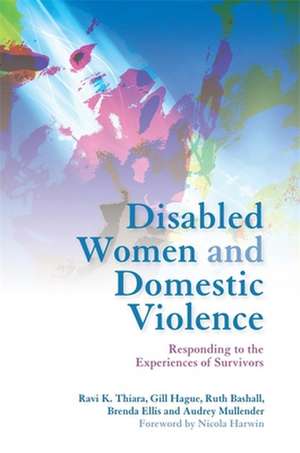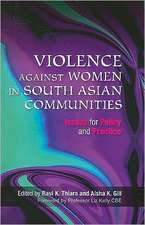Disabled Women and Domestic Violence
Autor Ravi K. Thiara, Gill Hague, Ruth Bashall, Brenda Ellis, Audrey Mullenderen Limba Engleză Paperback – 14 dec 2011
Preț: 196.89 lei
Preț vechi: 257.04 lei
-23% Nou
Puncte Express: 295
Preț estimativ în valută:
37.69€ • 40.95$ • 31.68£
37.69€ • 40.95$ • 31.68£
Carte disponibilă
Livrare economică 31 martie-14 aprilie
Preluare comenzi: 021 569.72.76
Specificații
ISBN-13: 9781849050081
ISBN-10: 1849050082
Pagini: 192
Dimensiuni: 112 x 228 x 14 mm
Greutate: 0.3 kg
Editura: Jessica Kingsley Publishers Ltd
ISBN-10: 1849050082
Pagini: 192
Dimensiuni: 112 x 228 x 14 mm
Greutate: 0.3 kg
Editura: Jessica Kingsley Publishers Ltd
Notă biografică
Ravi K. Thiara is Principal Research Fellow, University of Warwick, UK. She has conducted extensive research in the UK and elsewhere and written widely on violence against women. Gill Hague is Professor of Violence Against Women Studies, University of Bristol, UK, and a founder member of the Centre for Gender and Violence Research, University of Bristol. She has conducted key research nationally and internationally, and has worked on gender violence for nearly 40 years, publishing extensively in the field. Ruth Bashall is a prominent activist and consultant on disability issues and continues to be involved in organisations of disabled people. Brenda Ellis is a long standing campaigner for disabled women's rights and issues including domestic violence. Audrey Mullender is Principal of Ruskin College, Oxford, UK. Her distinguished research career has focused on domestic violence, post-adoption issues for birth relatives and groupwork theory.
Cuprins
Foreword by Nicola Harwin CBE, Chief Executive of Women's Aid Federation of England. 1. Introduction. 2. What the research tells us: A story of gaps and lacks. 3. Disabled women's experiences of domestic violence and abuse. 4. Professional responses to disabled women affected by domestic violence. 5. Understanding our history: the personal is political (Brenda Ellis and Ruth Bashall). 6. Nothing about us without us: policy and practice (Ruth Bashall and Brenda Ellis). 7. Ideas for moving forward: good practice and recommendations. 8. Looking more widely: strategic agendas and incorporating issues for disabled women experiencing domestic violence. 9. Conclusions.








